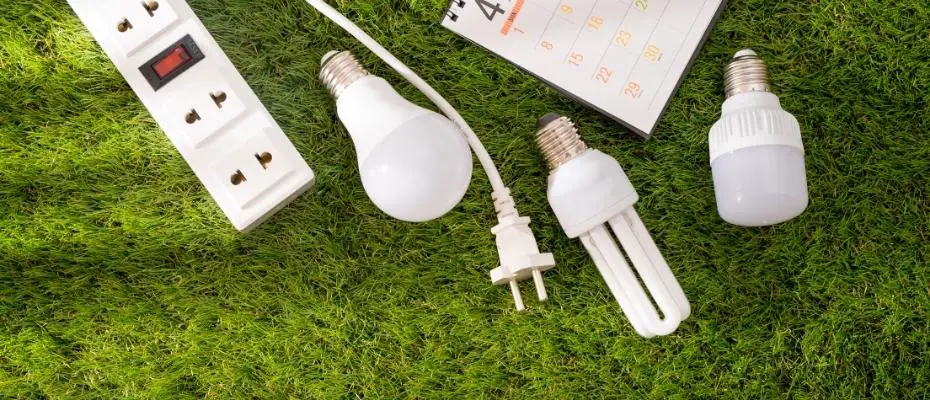Going green can be intimidating if you’re on a tight budget because often saving money and buying sustainably are placed against each other. However, it’s a common misconception that sustainable choices always cost a fortune. In fact, the reality can often be the opposite; many eco-friendly choices are also budget-friendly. So in this post, I’ll share some of the top ways that you can live a greener life while also saving money!
Eco-friendly ways to save money at home
1. Recharge
Various household gadgets, remotes and decorative items require batteries. Instead of disposable batteries, invest in a set of rechargeable batteries. Rechargeable batteries keep dead ones out of landfills and will save you money by avoiding repurchasing new batteries over time.
2. Replace your light bulbs
Another easy and eco-friendly way to save money is to replace your light bulbs with more energy-efficient ones. A small upfront investment in LED lightbulbs can save you money and a lot of energy over the lifespan of these bulbs.
LED lightbulbs use at least 75% less energy than standard incandescent bulbs and last 25 times longer. Even with the higher upfront cost included, you could save £153.40 by upgrading just one bulb to LED. If you had 8 bulbs to replace around the home, you would save a massive £1227.
3. Unplug devices
Whenever you leave an appliance on standby – rather than switching it off at the plug – it continues to drain energy. It’s estimated that as much as 9-16% of the electricity consumed in homes is used to power appliances when they are in standby mode. This wastage can add up to £86 to an annual electricity bill. Therefore, it’s recommended to switch off or unplug devices when not in use.

4. Cold wash
It’s no longer necessary to wash clothes in hot temperatures in order to get them clean. There are plenty of eco-friendly brands suggesting washing your clothes on a colder cycle that will save on your bills, as well as the environment. According to the Energy Saving Trust, washing clothes at 30 degrees rather than higher temperatures will save around 40% of the energy used each year.
Another eco-friendly tip is to wait till you have a full load of laundry to wash. The same also applies to a dishwasher. This saves both water and energy on washing your clothes.
5. Buy refills
Buying refills of products such as a toilet or air freshener, coffee, herbs and spices saves money as well as reduces plastic waste. Some refills will still result in plastic waste so it’s worth comparing how recyclable the packaging is compared to the original product.
6. Reduce food waste
If you’re guilty of throwing away food, you are likely wasting money while not being as environmentally friendly as you could. Here are a few simple ways to reduce your food waste and save some cash:
- Know the difference between “use by” and “best before”. While the former is all about food safety, the latter is just when the food has reached its optimum quality.
- Buy in bulk and freeze anything you won’t use before the use-by date.
- Make a meal plan to use everything.
- Buy loose fruit and veg so you can choose only the amount you need (and reduce plastic waste too!). Buying seasonal fruit and veg can also help to reduce costs and environmental impact.
- Recreate meals from leftover food.
- Write a list before you go shopping and avoid impulse purchases.

7. Tweak your diet
According to Loma Linda University, vegans have the smallest carbon footprint, generating 42% less greenhouse gas than meat-eaters do.
While you don’t have to go full-time vegan or even vegetarian, it’s worth considering cutting down meat consumption. Generally, eating a more plant-based diet and cutting meat (especially red meat) intake can be cheaper and more environmentally friendly.
8. Only fill the kettle with what you need
When making a cuppa, make sure you only fill up what you need to save on electricity. Alternatively, you can get an energy-saving kettle that comes with a low minimum fill line, and switches off after boiling. Descaling your kettle regularly can also help; the more limescale your device has, the more energy it consumes when boiling water.
9. Get a low-flow shower head
Switching to a low-flow showerhead is another eco-friendly way to save money. They’re inexpensive and can significantly shrink the amount of water you use every time you shower. A well-manufactured shower head can reduce your water consumption by 60%, which is a big saving. A good quality low-flow shower head that not only saves water but does it without making your shower feel like a drudge. Finally, it saves you money by putting less impact on your water heater.

10. Try reusable sanitary products
From menstrual cups to reusable sanitary pads and tampon applicators, there are plenty of ways to swap out traditional period products. For example, studies show that over time, using a menstrual cup costs just a fraction of the amount people spend on more common menstrual products.
In addition to saving money and being eco-friendly, many find reusable alternatives more comfortable and absorbent. These products are often designed to be as discreet as possible.
Sustainable ways to save money out
11. Use a reusable cup
As a nation of tea and coffee lovers, the UK gets through a lot of disposable cups. While takeaway cups are convenient, they are difficult to recycle due to many of them containing plastic (to keep them waterproof). Switching to a reusable cup can therefore make a difference. Eco-conscious coffee drinkers are not only helping to reduce the waste created by disposable cups but they’re also earning coffee shop discounts that could save you a good chunk of money a year. Most national coffee shop chains give you 25-50p off per drink when you bring a reusable cup.

12. Give up bottled water
Not only is bottled water ridiculously expensive, but it also contributes to unnecessary plastic usage and waste. While tap water is completely safe to drink in the UK, the water quality and taste are not the best – especially in areas with hard water, such as London. Instead of buying bottles, you can get a water filter or distiller home as an eco-friendly way to save money.
And when you’re out and about, make sure to bring a reusable water bottle. Sadly, most plastic bottles are not recycled and end up in landfill – or even worse, in our oceans. So save some cash, while saving the environment, and ditch bottled water.
It’s also worth checking the free Refill app that lists businesses that participate in the Refill scheme. The app lists over 30,000 locations – cafés, restaurants, shops, hotels and more – that let you fill up your own bottle or flask even if you’re not a customer.
13. Bring your own bag
Since May 2021, the Government has mandated a 10p charge for single-use carrier bags. It’s, therefore, a no-brainer to reuse old plastic bags or take your own reusable bags with you to the shops.
In addition to using a reusable bag to save money, some supermarkets even pay you for your used plastic bags. For example, Ocado gives you 10p for every used Ocado bag you give them to recycle.
14. Think twice before buying
Changing your consumption habits is one of the biggest ways you can reduce your carbon footprint, and of course, save a lot of money. We don’t need all the things shops and social media convince us we do. So get into the habit of being more discerning and mindful with your shopping choices. Here are a few ways to do this:
- Buy secondhand: As well as saving you money, buying second-hand will help reduce the number of products that are sent to landfills. It will also impact the carbon emissions involved in making new products. You can buy used items from charity shops or online marketplaces such as Facebook Marketplace, Gumtree, Depop or eBay.
- Borrow before buying: If you need something only occasionally or just once, why not ask friends or family first? Borrowing is a great option that will make you more environmentally friendly and save a lot of money in the long run.
- Avoid (online) impulse purchases: With online stores playing various psychological tricks to make you spend more, it’s easy to fall for buying unnecessary items. Even if you decided to return your purchase later for a refund, the process of online returns can be environmentally damaging. In addition to the transportation emissions, less than half of returned items actually end up being resold – the rest will end up in landfill!

Other eco-friendly ways to save money
Stop junk mail
Junk mail is not only annoying but it also consumes a lot of resources every day. All those ads also create a major temptation to spend money on things you don’t really need. Luckily, there are a few ways you can stop junk mail and thereby reduce your paper waste.
Probably the easiest way is to put a “no junk mail” sign on your door or your mailbox. You can also contact Royal Mail and ask it to stop delivering leaflets and brochures to your address.
Delete unnecessary emails and opt out from marketing newsletters
While everything digital-based is often considered to be more environmentally friendly than printing paper, it’s not completely harmless either. Useless emails are actually costing the planet; research suggests that one less email a day from every adult in the UK would save as much carbon as 81,152 flights from London to Madrid!
Do your part by sending and storing fewer unnecessary emails. It’s also worth opting out of all those marketing emails that can tempt you to buy and spend more.
Invest sustainably
The final eco-friendly tip is less about saving money and more about making other sustainable financial decisions. Socially responsible or green investing is any investment strategy which seeks to consider both financial return and social/environmental good. You might understand the importance of investing your money and have even started investing already. But have you considered how green your investment choices are? If not, my guide to responsible and sustainable investing can help you get started.


bills can take can a lot of money and turning off unnecessary is good.
Wow, what great tips and thank you for making them easy to implement, it’s really well explained. Great to think you can help the environment while also helping your budget.
Great ideas in this article. I feel that frugal living and being eco friendly go together well, as it’s often about making the most of what you have and not endless consumption of new things.
I’ll subscribe to keep up to date with your posts
Very impressive how we can be eco-friendly without needing to do much work,
thank you for sharing this important list frank 🙂